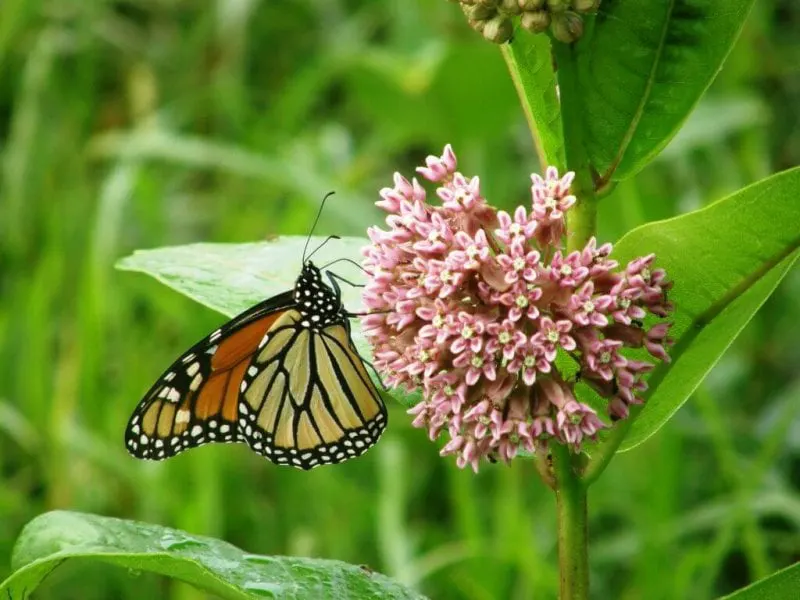Podcast — ‘We’re growing food now in a way that doesn’t leave room for other biodiversity’: How GMO crops are affecting the monarch butterfly and what can be done about it
Podcast — ‘We’re growing food now in a way that doesn’t leave room for other biodiversity’: How GMO crops are affecting the monarch butterfly and what can be done about it
Manoush Zomorodi, Sonia Altizer | NPR | May 14, 2021
XLinkedInFacebookRedditBlueskyThreads


[su_panel color=”#3A3A3A” border=”1px solid #3A3A3A” radius=”2″ text_align=”left”]Editor’s note: The following is an excerpt from an interview with University of Georgia ecologist Sonia Altizer and NPR host Manoush Zomorodi.[/su_panel] [ALTIZER]: It’s probably too late to turn the clock on GMO crops. And it is a controversial topic. So the technology itself isn’t, you know, harmful or evil. It’s just the way that these crops have been deployed and the scale at which they’ve been deployed. It means that we’re growing food now in a way that doesn’t leave room for other biodiversity.https://geneticliteracyproject.org/wp-content/uploads/2021/05/20210429_ted_04.mp3
ZOMORODI: So you actually link the monarch’s well-being to how we humans grow our food. Can you just explain what that link is, what the connection is between the two?
ALTIZER: Well, so monarchs need milkweed. Milkweed isn’t the only resource that they need. They also need nectar plants. But milkweed is the key resource that monarchs need to reproduce. And it’s an agricultural weed… And so one thing that has become popular since the late 1990s are crops that are genetically modified to resist common herbicides, like Roundup. And the herbicides can be sprayed on crop fields of soybean or corn, and the crops do just fine, but milkweeds and other agricultural weeds that would be providing nectar for monarchs would die.
Follow the latest news and policy debates on sustainable agriculture, biomedicine, and other ‘disruptive’ innovations. Subscribe to our newsletter.
Read the original post
XLinkedInFacebookRedditBlueskyThreads

 | Videos | More... |

Video: Nuclear energy will destroy us? Global warming is an existential threat? Chemicals are massacring bees? Donate to the Green Industrial Complex!
 | Bees & Pollinators | More... |

GLP podcast: Science journalism is a mess. Here’s how to fix it

Mosquito massacre: Can we safely tackle malaria with a CRISPR gene drive?

Are we facing an ‘Insect Apocalypse’ caused by ‘intensive, industrial’ farming and agricultural chemicals? The media say yes; Science says ‘no’
 | Infographics | More... |

Infographic: Global regulatory and health research agencies on whether glyphosate causes cancer
Does glyphosate—the world's most heavily-used herbicide—pose serious harm to humans? Is it carcinogenic? Those issues are of both legal and ...
 | GMO FAQs | More... |

Why is there controversy over GMO foods but not GMO drugs?
Genetic Literacy Project

How are GMOs labeled around the world?
Genetic Literacy Project

How does genetic engineering differ from conventional breeding?
Genetic Literacy Project
 | GLP Profiles | More... |

Alex Jones: Right-wing conspiracy theorist stokes fear of GMOs, pesticides to sell ‘health supplements’




 Trust issues: What happens when therapists use ChatGPT?
Trust issues: What happens when therapists use ChatGPT? Fighting deforestation with CO2: Biotechnology breakthrough creates sustainable palm oil alternative for cosmetics
Fighting deforestation with CO2: Biotechnology breakthrough creates sustainable palm oil alternative for cosmetics Viewpoint — Fact checking MAHA mythmakers: How wellness influencers and RFK, Jr. undermine American science and health
Viewpoint — Fact checking MAHA mythmakers: How wellness influencers and RFK, Jr. undermine American science and health Viewpoint: Video — Big Solar is gobbling up productive agricultural land and hurting farmers yet providing little energy or sustainabilty gains
Viewpoint: Video — Big Solar is gobbling up productive agricultural land and hurting farmers yet providing little energy or sustainabilty gains California, Washington, Oregon forge immunization alliance to safeguard vaccine access against federal undermining
California, Washington, Oregon forge immunization alliance to safeguard vaccine access against federal undermining 30-year-old tomato line shows genetic resistance to devastating virus
30-year-old tomato line shows genetic resistance to devastating virus The free-range chicken dilemma: Better for birds, but with substantial costs
The free-range chicken dilemma: Better for birds, but with substantial costs ‘You have to treat the brain first’: Rethinking chronic pain with Sanjay Gupta
‘You have to treat the brain first’: Rethinking chronic pain with Sanjay Gupta
